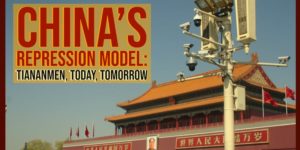Xi Jinping‘s shift to Neo-Stalinism may hasten rather than retard China’s eventual democratization, says a leading expert.
While he seems to think that he is the only man who can save China’s ruling Communist Party (CCP) from its extinction, according to a VOA Chinese language news report, Claremont McKenna College Professor Minxin Pei believes that China’s president has not learned the right lessons from the collapse of the Soviet Union. His Neo-Stalinist policies may yet make him the gravedigger of the CCP’s one-party dictatorship, it adds in one of the weekend’s “most visited news stories” on VOA’s Chinese website.
Xi is convinced that his survival strategy will reinvigorate a decaying post-totalitarian regime, but it will almost certainly exacerbate existing tensions, create new challenges, and undermine the CCP’s prospects of long-term survival, Pei said, delivering the seventeenth annual Seymour Martin Lipset Lecture on Democracy in the World (above) presented by the Embassy of Canada and the National Endowment for Democracy (NED).
Projections suggest that by 2035, China will have a per capita income equal to that of Chile today and some 300 million college-education citizens, producing a society with considerable capacity to effect democratic change “if it wants to”, Pei argued.

National Endowment for Democracy
The Chinese Communist Party, since the time of Mao Zedong, has relied on three main pillars in order to maintain its iron grip on China and Xi has used these three Ps – control of personnel, propaganda, and the People’s Liberation Army to consolidate his power, says a dissident from the ruling elite. Cai Xia, a Professor at the the Chinese Communist Party’s Central Party School from 1998 to 2012, reluctantly concluded that Xi would not lead a struggle for political reform.
After Xi released his comprehensive reform plan in late 2013, business and academic circles excitedly predicted that he would push ahead with major reforms. My feeling was just the opposite. The plan avoided all the key issues of political reform, she writes for Foreign Affairs:
China’s long-standing problems of corruption, excessive debt, and unprofitable state enterprises are rooted in party officials’ power to meddle in economic decisions without public supervision. Trying to liberalize the economy while tightening political control was a contradiction. Yet Xi was launching the biggest ideological campaign since Mao’s death to revive Maoist rule. His plan called for intensified societal surveillance and a clampdown on free expression. A ban on any discussion of constitutional democracy and universal values was shamelessly promoted under the banner of “governance, management, service, and law.”
The Party That Failed – reinforcing Minxin Pei’s arguments in his recent Lipset lecture for the @NEDemocracy‘s @ThinkDemocracy https://t.co/2hcwcY6QUo via @ForeignAffairs
— Democracy Digest (@demdigest) December 8, 2020
It was during his experience of exchanges with the CCP party school that Minxin Pei realized the ruling party had no interest in political reform, puncturing his assumption that economic modernization would prompt liberalization. his shift in perspective was confirmed when Xi’s famous speech in early 2013 showed his determination to harden CCP rule, he said in his Lipset lecture.
Quisling kleptocrats
A recent State Department paper assign too much weight to what they alternately call “Marxist-Leninist” or “socialist” ideology as the ideological underpinning of China’s global ambitions, argues Daniel Baer, a senior fellow at the Carnegie Endowment for International Peace and former U.S. ambassador to the Organization for Security and Cooperation in Europe.
Today’s Chinese Communist Party Central Committee is not made up of revolutionary partisans philosophically committed to the international triumph of the proletariat; they are the quisling kleptocrats who inherited a repressive regime from the previous two generations and are trying to maintain their grip on power for as long as possible. In general, their professions of commitment to communism—like their increasingly virulent nationalism—are more of a means than an end, he writes for Foreign Policy.
in light of the 17th annual Seymour Martin Lipset Lecture, check out this list of books and articles by this year’s speaker, Dr. Minxin Pei. #NEDEvents https://t.co/cRvzHoI5CO
— DemocracyResourceCtr (@NEDLibrary) December 2, 2020
Seymour Martin Lipset’s modernization theory helps illuminate why the connection between economic development and democratization is not as straightforward, said Pei. Unique events can account for failure of democracy to persist. Specifically, the more resources, status and wealth are concentrated in the state, the more difficult it is for a democratic transition to take hold.
 Democratizing Communist dictatorships creates unique problems because of the legacy of totalitarian institutions – a capable coercive apparatus, effective control of information, and state control of the key economic sectors which enable dictatorships to blunt and even neutralize the democratizing effects of economic development, he added.
Democratizing Communist dictatorships creates unique problems because of the legacy of totalitarian institutions – a capable coercive apparatus, effective control of information, and state control of the key economic sectors which enable dictatorships to blunt and even neutralize the democratizing effects of economic development, he added.
The strategic choice to maintain single party rule during economic reform was largely successful in preserving the totalitarian Leninist party-state, economy, and media, said Pei. Furthermore, as Andrew Nathan’s 12th annual Lipset lecture (below) illustrated, economic growth created a distinctive middle class, uniquely dependent on the state.
The rise of Xi demonstrates how lack of democratic reform and rule of law facilitate the rise of a strongman who can impose his will on the party-state and society through the rule of fear and ideological re-indoctrination, he noted. Strict restrictions placed on civil society in the post-Tiananmen period stunted the growth of autonomous social organizations that would have constituted a driver for democratization from below. Through its control of resources and opportunities the CCP was able to co-opt elites, broaden its base of support and stifle independent civil society.
Xi’s neo-Stalinist revolution has employed such instruments as revived ideological indoctrination as part of a survival strategy to reinvigorate a decaying regime, said Pei. Rapid economic growth has allowed the CCP to gain more resources to modernize and strengthen its repressive capacity, expand its surveillance of political threats, and neutralize the potentially liberalizing effects of technological progress.
The long journey from Maoism to post-Stalinism will only delay not deny China’s march from long dark shadow of its totalitarian past, he added. A transition from communism led by economic reform under the rule of a one-party state will get stuck because entrenched interests whose fortune is intertwined with the Leninist party-state will use the power of the legacy institutions of totalitarianism to defend their privileges.
Xi is convinced after eight years in power that his neo-Stalinist survival strategy has altered the trajectory of post-Mao China and will reinvigorate a decaying post-totalitarian regime. Yet it will also exacerbate existing tensions, create new challenges, and undermine the CCP’s prospects of long-term survival, said Pei.
Technology can’t beat psychology
 The regime’s AI surveillance state will ultimately be marginal to the success (or not) of the one-Party system, he said, as even a technologically capable repressive state cannot maintain power if its economy is failing, its elites are demoralized, and citizens come to the realization that the status quo is intolerable.
The regime’s AI surveillance state will ultimately be marginal to the success (or not) of the one-Party system, he said, as even a technologically capable repressive state cannot maintain power if its economy is failing, its elites are demoralized, and citizens come to the realization that the status quo is intolerable.
In short, technology cannot trump psychology – as the highly-repressive GDR demonstrated. Witness the early February explosion on Chinese social media against the government over the fate of the doctor intimidated for exposing the coronavirus. The high number of social protests also shows that citizens retain a sense of justice and values, and will mobilize to advance their interests.

National Endowment for Democracy (NED)
Chinese influence operations have seen a post-Xi shift from opportunistic to strategic intent, said Pei. But the regime may be forced to retrench and reverse the expansion of its premature, costly, over-ambitious overreach, which would raise further doubts about Xi’s wisdom.
The Lipset lecture has attracted among the best minds thinking about democracy in many different countries, regions, and more broadly, in the world, said Stanford’s Francis Fukuyama (@FukuyamaFrancis) in opening remarks.
CEPA analyst Edward Lucas suggests A China strategy for the transatlantic democracies. His CEPA colleague Franklin Holcomb explains how to Counter Russian and Chinese cyber aggression.







